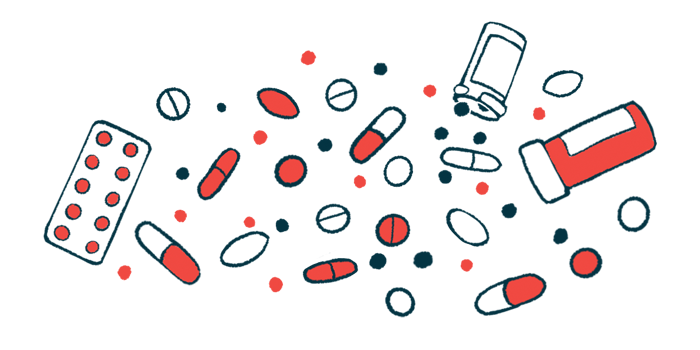Isturisa Effective in Certain Ectopic Cushing’s Patients in New Study
Therapy found to ease symptoms of intense hypercortisolism
Written by |

Isturisa (osilodrostat), a medication that blocks cortisol production, was effective in a group of patients with intense and severe hypercortisolism caused by ectopic Cushing’s syndrome, an observational study reported.
Of a total of 33 patients, 11 received Isturisa as a first-line monotherapy, while 13 were given it as a second-line single treatment. The remaining nine individuals received the therapy in combination with another anti-cortisol medicine.
Researchers found that treatment with Isturisa led to a significant decrease in 24-hour urine cortisol levels (24h-urine) in all groups. In fact, 82% of the patients in the first group saw their cortisol reach normal levels in a median of two weeks, confirming the therapy’s efficacy.
In parallel, Isturisa eased major clinical symptoms of the disease, including high blood pressure, high blood sugar levels, and low blood potassium levels.
“The data we compiled in this real-life observational study are to our knowledge the largest reported series of [ectopic] Cushing’s that received this medical treatment,” the researchers wrote, adding that Isturisa “is an effective drug in patients with intense and severe hypercortisolism caused by [ectopic Cushing’s].”
Study using real-life data
The study, “Efficacy and safety of osilodrostat in paraneoplastic Cushing’s syndrome: a real-world multicenter study in France,” was published in The Journal of Clinical Endocrinology & Metabolism.
Cushing’s syndrome is characterized by hypercortisolism, or high cortisol levels. In most cases, the excessive production of this hormone is caused by a tumor in the brain’s pituitary gland, which releases large amounts of adrenocorticotropic hormone (ACTH). ACTH controls cortisol production. In such cases, patients are said to have Cushing’s disease.
In a minority of cases, however, ACTH is produced and released by an ectopic extra-pituitary neuroendocrine tumor — a hormone-producing tumor found outside the pituitary gland.
Ectopic Cushing’s is associated with severe hypercortisolism, often leading to life-threatening clinical symptoms. Such symptoms can include low blood potassium levels, diabetes, and high blood pressure, as well as infections and mental disorders.
Isturisa is an oral therapy that inhibits an enzyme involved in cortisol production, preventing excessive amounts from being produced. Previous prospective studies have demonstrated its efficacy at lowering cortisol levels in Cushing’s disease patients.
“However, [Isturisa] has been evaluated in only a handful of patients with [ectopic Cushing’],” the researchers wrote.
“Preliminary results of these case reports suggest effective control of hypercortisolism,” the team noted.
To find out more, the researchers evaluated Isturisa’s efficacy at blocking cortisol production in a group of patients with ectopic Cushing’s. All were treated with the medication between May 2019 and March 2022.
Among them were 15 women and 18 men, with a median age of 65 (range 24–85 years). The majority were found to have serious hypercortisolism, with a median level of urine cortisol of 1,867 micrograms (mcg)/24h (upper limit normal range of 45–80 mcg/24h).
The patients also showed comorbidities or other co-existing conditions related to hypercortisolism. Nearly all (91%) had low blood potassium levels, with high blood pressure (88% of cases), and diabetes (64% of cases) also very common.
Cortisol levels drop with Isturisa
A group of 11 patients received Isturisa as a first-line treatment, with a median starting dose of 10 mg/day and a maximum of 20 mg/day. A second group of 13 patients — previously treated with other anti-cortisol therapies that had to be stopped — were given Isturisa as a second-line treatment. The median initial dose in this group was 4 mg/day, and the median maximum dose was 25 mg/day.
In addition, a third group of nine patients received Isturisa in combination with another anti-cortisol therapy — mainly metyrapone or ketoconazole. The median initial dose of Isturisa was 4 mg/day, and the maximum dose was 40 mg/day.
Researchers found the 24h-urine cortisol levels in the first group dropped significantly — from a median of 1,678 to 5 mcg/24h. Nine of these patients saw their cortisol levels normalize in a median of two weeks.
The 10 non-previously controlled patients in the second group also experienced a significant reduction in urine cortisol levels, which dropped from 158 to 12 mcg/24h. For the other three patients, cortisol levels — already normalized at the time of treatment initiation — were maintained.
The third group showed similar results, with decreased urine cortisol levels that dropped from a median of 588 to 28 mcg/24h.
Together with these results, clinical symptoms presented at diagnosis greatly improved with Isturisa, promoting the discontinuation or dose reduction of patients’ treatments.
In the case of blood potassium, the median level at the start of 2.5 millimoles per liter (mmol/L; normal range 3.6–5.2 mmol/L) increased to 3.8 during treatment and to 4.2 after. Blood sugar levels decreased from 120 to 90 mg/dL (normal range 72–99 mg/dL). The number of patients requiring insulin also dropped, from 11 to 8.
Moreover, for blood pressure, initial median values of 143/77 mmHg (normal pressure: 120/80 mmHg or lower) dropped to 126/69 mmHg, decreasing the need for medicines to control it.
However, adrenal insufficiency of a grade of 3–4 (severe to life-threatening) was reported in eight patients. Adrenal insufficiency is a condition in which the adrenal glands sitting atop the kidneys are unable to produce enough of certain hormones, including cortisol.
“We have provided real-world data that clearly demonstrate the efficacy of cortisol [production] inhibition by [Isturisa] monotherapy in the large series of [ectopic Cushing’s patients], including patients with very intense hypercortisolism,” the research team wrote.
“Our data also indicate good tolerability in the majority of patients. However, the onset of adrenal insufficiency is common and must be actively prevented by incisive therapeutic education in order to avoid the onset of acute adrenal insufficiency, the outcome of which may be fatal,” they wrote.







